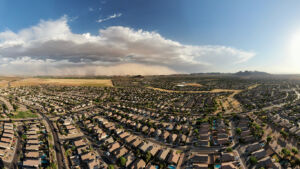Gov. Doug Ducey today released a statement regarding the passage of Arizona’s fiscally conservative, balanced budget, calling it a “historic down payment on securing Arizona’s future.”
“With this budget, Arizona is learning from the mistakes of the past, exercising fiscal responsibility, investing in the things that matter and making a historic down payment on securing Arizona’s future,” said Governor Ducey. “Arizonans from all walks of life came out to support this plan — law enforcement, education advocates, school counselors, business leaders, health care professionals, rural and urban elected officials, agricultural representatives, taxpayer advocates, students, parents and more. My thanks to all the legislators, citizens and stakeholders who came together to help get this fiscally responsible plan across the finish line — I look forward to signing it.”
The budget plan pays down debt, provides revenue-neutral tax relief to individuals and families and adds $542 million to Arizona’s Rainy Day Fund, bringing it to a record $1 billion. The plan also fully funds education above and beyond inflation, including fulfilling 20 percent teacher pay raises by 2020, expanding the Arizona Teachers Academy and workforce programs, restoring $136 million in flexible funding for public schools and investing in new school counselors and cops on campus.
|
The budget also reflects many of the priorities set by Gov. Ducey, the Arizona Board of Regents and the University of Arizona. The budget includes $35 million in one-time funding distributed among the three state universities based on the number of resident students. This represents a $27 million increase over the FY2019 budget, which appropriated $8 million to the three universities. “Thank you to Gov. Ducey for his leadership and to the Arizona House and Senate for passing a strong Arizona budget,” said UA President Robert C. Robbins. “The budget reinforces the state’s commitment to higher education, K-12 and community colleges. This budget also tackles state problems, including a statewide physician shortage. I am grateful for the hard work by the governor and all lawmakers and their staffs.” |
Other significant investments include over $225 million for upgrading roads and bridges across the state, including $130 million to expand I-17 to northern Arizona; $74.7 million to provide pay raises to State Troopers, Correctional Officers, child safety caseworkers and other public safety personnel; $11 million to fund 48 State Troopers for key public safety missions across the state; $56 million to expand childcare subsidies for low-income families; and $1.6 million to preserve access to health care for over 6,000 Arizona kids.
The Arizona Hospital and Healthcare Association (AzHHA), the organization giving Arizona hospitals a voice to collectively build better healthcare and health for Arizonans, congratulated Ducey and state leaders for passing a state budget that wisely invests in the health of Arizona’s people, patients and communities and will grow our economy.
“AzHHA applauds Gov. Ducey and the lawmakers at the state capitol for passing a budget that makes a solid investment in the health of all Arizonans,” says AzHHA President and CEO Ann-Marie Alameddin. “From eliminating the KidsCare enrollment freeze to combating the state’s physician shortage by providing state funding for Graduate Medical Education, this is a budget healthcare leaders across the state can support, that will directly benefit each and every Arizonan across the continuum of care.”
“Arizona is one of the fastest-growing states in the nation and, as such, has significant healthcare needs,” explains Alameddin. “This budget is the start of a plan today that meets the state’s healthcare needs of tomorrow.”
For a list of Arizonans who have expressed support for the budget, click HERE.
For additional information on the budget, click HERE.
Highlights of Arizona’s balanced, fiscally conservative budget include:
K-12 Education
• $165 million to fully fund 20 percent teacher pay raises by school year 2020
• $136 million to speed up the restoration of recession-era cuts to District and Charter Additional Assistance
• $88 million for school building renewal
• $76 million for new school construction
• $30 million in new dollars for high-performing schools through results based funding
• $20 million to hire more school counselors and cops on campus
• $10 million to grow Career and Technical Education programs at public high schools
• $1.5 million in permanent funds for Foster Youth Education
• $800,000 to hire 10 new employees at the State Board for Charter Schools
• $700,000 for county juvenile detention center education programs
• $500,000 for the Boys and Girls Club
Higher Education
• $35 million in funding for Arizona’s three public universities, ASU, U of A and NAU
• $15 million in permanent, ongoing funds to expand the Arizona Teachers Academy
• $15 million to expand the Pima Community College Aviation Technology Center
• $14.2 million for rural community colleges outside of Pima and Maricopa County
• $6 million over three years for STEM programming at Maricopa and Pima Community Colleges
• $5.8 million to expand Maricopa County Community College’s healthcare offerings
• $1 million for Diné College, a community college on the Navajo Nation
• $1 million for the National Guard Tuition Reimbursement
• $500,000 for Northern Arizona University’s Freedom School
Public Safety
• $74.7 million to provide raises to public safety personnel including
• $40.6 million for Correctional Officer pay increases;
• $21.5 million for State Troopers at the Department of Public Safety;
• $5.5 million for caseworker raises at the Department of Child Safety;
• $3.2 million for Youth Correctional Officers at the Department of Juvenile Corrections;
• $2.8 million for public safety personnel at the Department of Health.
• $11 million to hire 48 new state troopers
• $4 million for Department of Public Safety vehicle replacement
• $3.9 million for a West Valley Readiness Center operated by the Department of Emergency and Military Affairs
• $1 million for 10 additional healthcare monitoring staff at the Department of Corrections
• $1 million for additional Arizona Peace Officer Standards and Training Board training
• $271,000 for a Sierra Vista Public Safety Communications Center
Infrastructure & Economic Development
• $130 million over three years to expand Interstate 17
• $95.3 million for targeted priority infrastructure projects
• $11.3 million to eliminate counties paying for a share of operating costs at the Arizona Department of Juvenile Corrections
• $3 million to expand broadband services in underserved rural areas
• $2.2 million for the Arts
• $1.1 million to promote tourism, including Arizona’s farm wineries
• $1 million for a business one-stop, helping entrepreneurs furthering Arizona’s economic growth
• $700,000 for a Mariposa Port of Entry Cold Inspection Facility
Health & Welfare
• $56 million in federal funds for childcare subsidies for low-income, working families
• $15 million deposit into the state Housing Trust Fund to prevent and alleviate homelessness
• $13 million for new developmental disability provider funding
• $7 million in provider funding for elderly in-home and nursing care through Arizona Long Term Care System Provider Funding
• $5 million in funding for health care research at the Translational Genomics Research Institute
• $2.4 million to expand the kinship stipend to all kinship caregivers
• $2 million for Alzheimer’s research
• $1.6 million to eliminate the KidsCare Freeze, protecting coverage for over 6,000 Arizona kids
• $1.6 million to help reduce suicides in Arizona’s military and veteran population
• $1.5 million for Benson and Northern Cochise Community Hospitals in Cochise County
• $1 million to reimburse family caregivers for 50% of their qualifying expenses
• $1 million for prenatal equipment at rural Arizona hospitals
• $1 million for Arizona food banks
• $700,000 for a primary care clinic in Colorado City
Natural Resources
• $37 million to implement the multi-party Drought Contingency Plan that will secure Arizona’s water future
• $20 million to promptly reimburse local Arizona fire districts for combating wildfires
• $2.6 million for Nogales wastewater treatment infrastructure
• $2 million for the eradication of the Salt Cedar, a non-native invasive species that poses environmental and fire risks
• $1 million to increase funds for the Forestry Hazardous Vegetation Removal, for a total of • $3 million annually, to remove vegetation that poses fire risks to property and life
• $1.2 million to replace a pedestrian viewing bridge at Tonto Natural Bridge State Park
• $1 million for a forestry fire training center in Snowflake, Arizona
• $750,000 for a Mount Lemmon Fire District Water line
• $700,000 for upgrades to the Great Western Trail for Off Highway Vehicles
• $100,000 for Dairy Inspector pay raises and additional inspectors
• $30,000 for pay raises at the Department of Agriculture



